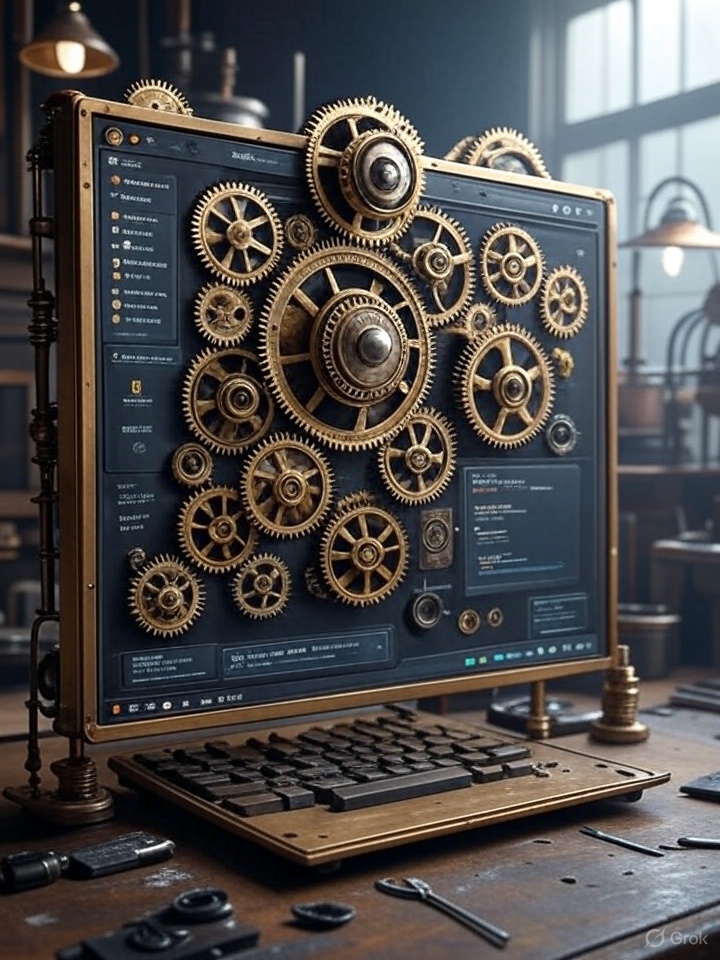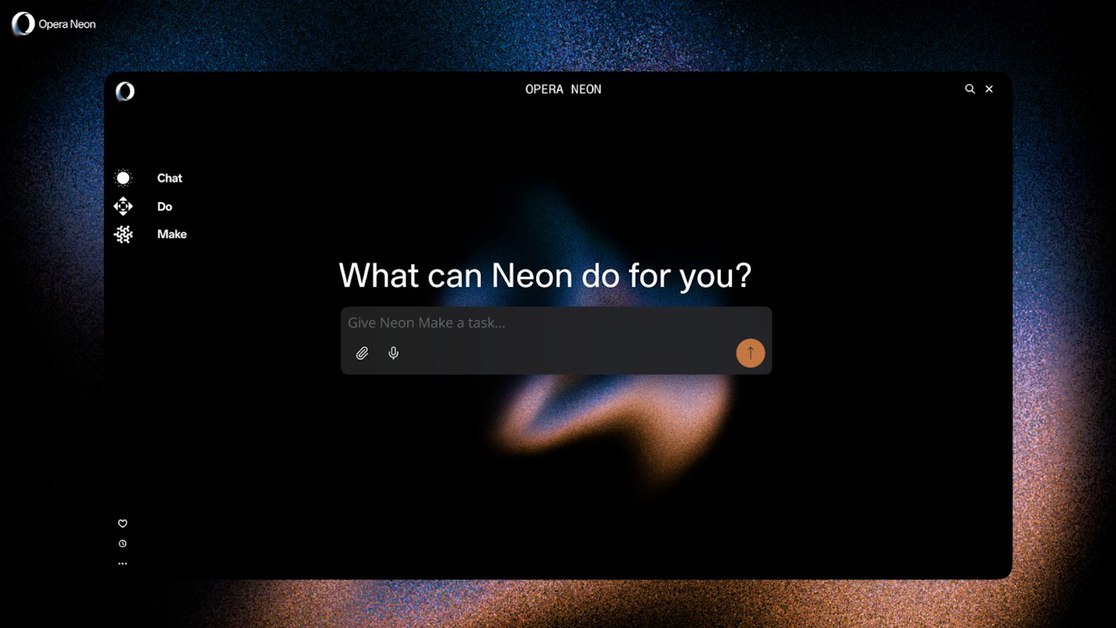At the Browser Days 2025 event in Lisbon, Portugal, Opera introduced a preview of its latest innovation: Opera Neon, an AI-driven browser set to redefine how we interact with the web.
Announced on May 28, 2025, Neon leverages artificial intelligence to automate routine tasks, promising a seamless and efficient browsing experience. With its unique features and futuristic approach, Opera Neon is positioning itself as a pioneer in the evolving landscape of agentic browsing. Here’s what you need to know about this revolutionary browser.
A Glimpse into the Future of Browsing
 Opera Neon, showcased at the Lisbon event, is designed to take the hassle out of everyday online tasks by using AI to act on users’ behalf. Imagine this: you’re planning a trip and need train tickets. Instead of navigating booking sites yourself, you prompt Neon to handle it — “Book train tickets for my trip next week” — and go back to watching YouTube videos.
Opera Neon, showcased at the Lisbon event, is designed to take the hassle out of everyday online tasks by using AI to act on users’ behalf. Imagine this: you’re planning a trip and need train tickets. Instead of navigating booking sites yourself, you prompt Neon to handle it — “Book train tickets for my trip next week” — and go back to watching YouTube videos.
In the background, Neon’s AI gets to work, scouring the web, comparing options, and preparing the booking. It only returns to you when it needs final confirmation, ensuring a hands-off experience that saves time and effort.
This capability stems from Opera’s years-long development of agentic AI, which began showing promise earlier in 2025 with the introduction of Browser Operator, an AI agent that could perform tasks like online shopping or trip planning. Neon takes this technology further, embedding it into a fully-fledged browser that acts as a personal assistant, collaborator, and creator—all in one.
Three Buttons, Endless Possibilities
 Opera Neon introduces three new buttons on its sidebar, each tied to a distinct AI function: Chat, Do, and Make. These features make Neon more than just a browser — they transform it into a powerful tool for productivity and creativity.
Opera Neon introduces three new buttons on its sidebar, each tied to a distinct AI function: Chat, Do, and Make. These features make Neon more than just a browser — they transform it into a powerful tool for productivity and creativity.
- Chat: This button opens a chatbot interface, allowing users to search the web, get answers to questions, or request contextual information about the page they’re viewing. Need a quick summary of a lengthy article? Neon’s Chat has you covered.
- Do: Powered by Opera’s Browser Operator AI, the Do button automates tasks like booking tickets, filling out forms, or shopping online. It’s designed to understand user intent and execute actions with minimal input, as demonstrated by the train ticket example.
- Make: Perhaps the most exciting feature, Make lets users create digital content with simple prompts. Want to build a website, prototype a game, or generate a report? Just tell Neon what you need — “Make a website for my blog” — and it will generate it for you, even if you lack technical skills.
These features highlight Neon’s versatility, catering to casual users, professionals, and creators alike. Whether you’re automating mundane tasks or bringing a creative idea to life, Neon aims to make the process effortless.
Privacy, Autonomy, and Offline Capabilities
 One of Opera Neon’s standout features is its ability to fully understand web pages without sending data to remote servers. Using a document object model (DOM) tree, Neon processes pages locally, ensuring privacy and faster response times. This local-first approach addresses growing concerns about data security in AI-driven tools, making Neon a compelling option for privacy-conscious users.
One of Opera Neon’s standout features is its ability to fully understand web pages without sending data to remote servers. Using a document object model (DOM) tree, Neon processes pages locally, ensuring privacy and faster response times. This local-first approach addresses growing concerns about data security in AI-driven tools, making Neon a compelling option for privacy-conscious users.
But Neon doesn’t stop there. For more complex tasks, it can operate autonomously in the cloud via a virtual machine. This means you can give Neon a prompt — like researching a topic or building a game — close your laptop, and walk away.
When you return, Neon will have processed the request and delivered the results, even if you were offline. This hybrid approach combines the best of local and cloud-based AI, offering flexibility and convenience.
A Work in Progress with Early Access Available
 Opera Neon is still in development, but the company is already generating buzz with its forward-thinking approach.
Opera Neon is still in development, but the company is already generating buzz with its forward-thinking approach.
At Browser Days 2025, a live demo of Neon’s Browser Operator successfully ordered flowers for a journalist, albeit with a slight nudge from the team—a promising sign for a technology still in its early stages. Since then, Opera has been refining Neon to iron out initial hiccups, ensuring it can handle real-world tasks with greater reliability.
For those eager to try Neon, Opera has opened a waitlist for early access at https://www.operaneon.com/.
As a premium subscription product, Neon will require a fee, though pricing details remain undisclosed. This move reflects Opera’s strategy to target early adopters and tech enthusiasts willing to invest in cutting-edge technology.
 Also read:
Also read:
- Netflix Turns Pitch Meetings into a Comedy Show—And It Sounds Like a Genius Idea!
- Cyberpunk 2 Enters Pre-Production: CD Projekt Red Report Reveals Nearly 200 Developers on Board
- Fill Your Tank with Air—It’s Now a Reality
The Bigger Picture: A Browser for the AI Age
 Opera Neon isn’t just a browser — it’s a vision of what the web could become in the age of intelligent agents. By integrating AI directly into the browsing experience, Opera is challenging the status quo and competing with tech giants like Google and Microsoft, who are also exploring AI-powered browsing solutions. However, Neon’s emphasis on privacy, local processing, and autonomous task execution sets it apart in a crowded market.
Opera Neon isn’t just a browser — it’s a vision of what the web could become in the age of intelligent agents. By integrating AI directly into the browsing experience, Opera is challenging the status quo and competing with tech giants like Google and Microsoft, who are also exploring AI-powered browsing solutions. However, Neon’s emphasis on privacy, local processing, and autonomous task execution sets it apart in a crowded market.
While the technology holds immense potential, questions remain. Can Neon deliver consistent results for complex tasks like trip planning or coding? Will users trust an AI to handle sensitive actions like online purchases? Opera’s track record of innovation—introducing features like tabs and built-in VPNs decades ago—gives it credibility, but Neon’s success will depend on its ability to perform reliably in real-world scenarios.
For now, Opera Neon offers a tantalizing glimpse into the future of browsing, where AI doesn’t just assist but actively works for you. Whether you’re a productivity seeker, a creative mind, or simply curious about the next big thing, Neon is worth keeping an eye on. Sign up for early access and see for yourself how Opera is reimagining the web—one prompt at a time.
Word count: ~350
This article is concise, structured, and engaging, detailing Opera Neon’s AI features, its demonstration at Browser Days 2025, and its potential impact, while including the early access link.






